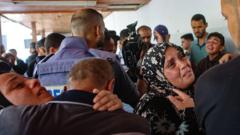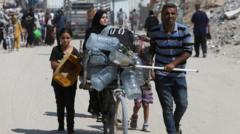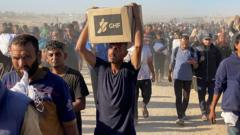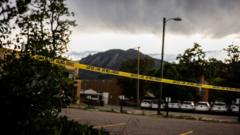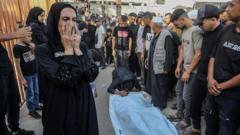*In a devastating turn of events, an attack on a UN aid convoy in North Darfur underscores the ongoing humanitarian crisis in Sudan, amidst accusations of military aggression from both sides of the conflict.*
**Tragic Assault on UN Convoy Claims Lives in Sudan**
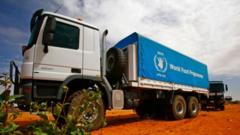
**Tragic Assault on UN Convoy Claims Lives in Sudan**
*Sudanese conflict escalates as aid efforts tragically interrupted, leaving five dead.*
The United Nations has reported that five members of a humanitarian aid convoy were killed in an attack while en route to the besieged city of el-Fasher, located in the conflict-ridden region of North Darfur. Several others sustained injuries, and multiple trucks were set ablaze during the incident that occurred late Monday near el-Koma, a strategic area controlled by the paramilitary group Rapid Support Forces (RSF).
In the wake of this tragic incident, rival factions – the RSF and Sudan's regular army – have exchanged blame, accusing one another of using drones in this violent assault. Although the specific details remain unverified, the UN has called for an immediate investigation to bring those responsible to justice.
The convoy, consisting of fifteen trucks from the UN’s World Food Programme (WFP) and the Unicef, was tasked with delivering essential food and nutritional supplies to the famine-afflicted population of el-Fasher. Regrettably, the attack prevented these much-needed resources from reaching the vulnerable families and children desperately in need of assistance.
El-Fasher remains under army control, yet the area has seen sustained attacks from the RSF over the past year, including the recent bombardments that led to a staggering number of civilian casualties. The local emergency response outfit, the el-Koma Emergency Room, released footage showcasing a scorched truck filled with humanitarian goods and placed the blame for the attack squarely on the Sudanese military.
Recent reports indicate that airstrikes by the army on el-Koma resulted in at least 89 casualties, further intensifying the suffering in a region already facing one of the world’s worst humanitarian crises due to a civil war that erupted in 2023.
According to the UN refugee agency, over four million individuals have fled the chaos since the conflict's inception, which stemmed from a bitter power struggle following a failed coup that interrupted Sudan's established transition toward democracy.
As international observers and humanitarian organizations scramble to respond, the situation continues to deteriorate, leaving countless lives hanging in the balance.
In the wake of this tragic incident, rival factions – the RSF and Sudan's regular army – have exchanged blame, accusing one another of using drones in this violent assault. Although the specific details remain unverified, the UN has called for an immediate investigation to bring those responsible to justice.
The convoy, consisting of fifteen trucks from the UN’s World Food Programme (WFP) and the Unicef, was tasked with delivering essential food and nutritional supplies to the famine-afflicted population of el-Fasher. Regrettably, the attack prevented these much-needed resources from reaching the vulnerable families and children desperately in need of assistance.
El-Fasher remains under army control, yet the area has seen sustained attacks from the RSF over the past year, including the recent bombardments that led to a staggering number of civilian casualties. The local emergency response outfit, the el-Koma Emergency Room, released footage showcasing a scorched truck filled with humanitarian goods and placed the blame for the attack squarely on the Sudanese military.
Recent reports indicate that airstrikes by the army on el-Koma resulted in at least 89 casualties, further intensifying the suffering in a region already facing one of the world’s worst humanitarian crises due to a civil war that erupted in 2023.
According to the UN refugee agency, over four million individuals have fled the chaos since the conflict's inception, which stemmed from a bitter power struggle following a failed coup that interrupted Sudan's established transition toward democracy.
As international observers and humanitarian organizations scramble to respond, the situation continues to deteriorate, leaving countless lives hanging in the balance.



